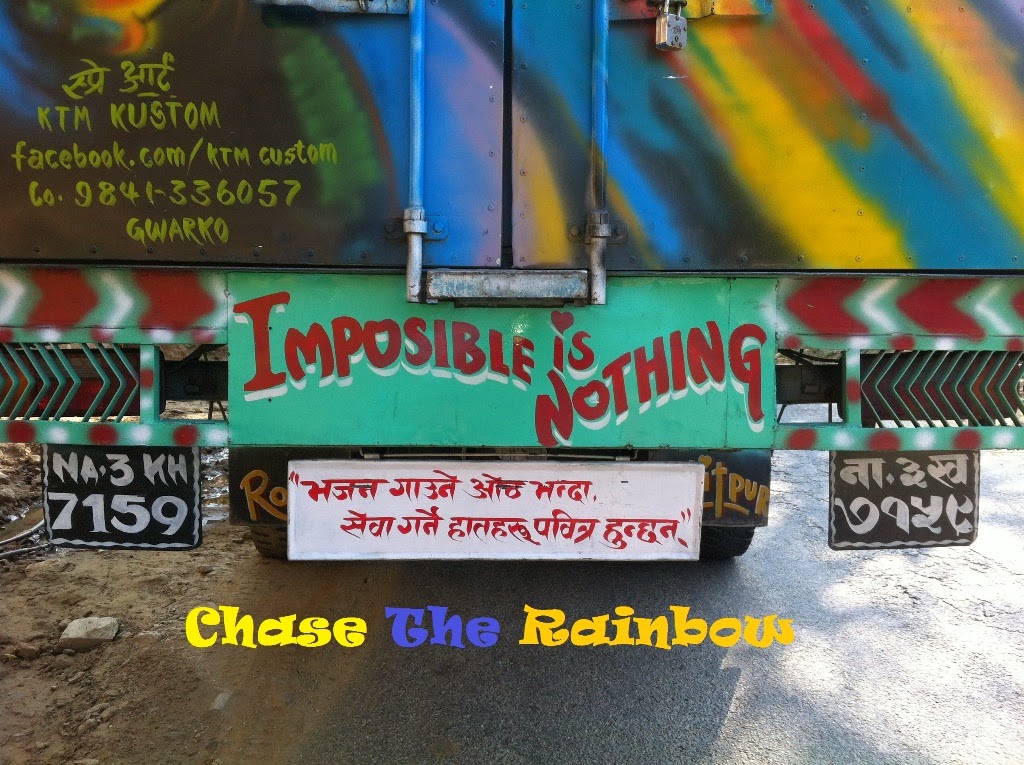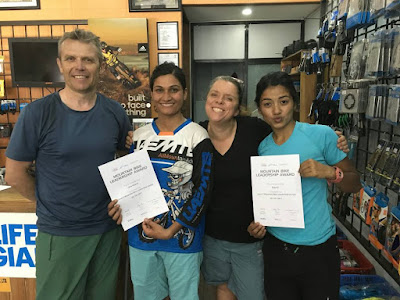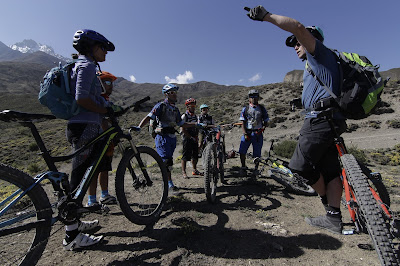Something is happening in Nepal. A wind of change is blowing, a gentle breeze that might yet become a tempest.
Sport, that great leveller of people, is beginning to make its mark. Tenacious young women like Ultrarunner Mira Rai and Mountainbiker Laxmi Magar have through their own efforts inspired other young women to dare to dream.
These dreams are then facilitated by people like Richard Ball from Trail Running Nepal, working tirelessly to promote running and running events, and helping and promoting the potential of Nepali athletes on the world stage. Richard, of course, makes a living from this, and rightly so, but he is also making dreams happen too.
Now we have Jenny Caunt, from Himalayan Singletrack, a mountainbike shop owner and tour provider based in the beating heart of Nepali tourism; Thamel, Kathmandu.
Jenny is also doing something remarkable. In the west we might call it progression, continuity, or something similar, we take equal opportunities for granted; in Nepal it is pioneering, it is the rejection of boundaries, prejudice, regression, in a deeply misogynistic society. She is empowering women to get involved in this completely male dominated industry, and she is giving them jobs - equal jobs.
And guess what? They're good at it.
Jenny is a very good friend of mine, and when she told me what they were doing I asked her to write me a little piece for the blog. I was proud of my friend and I wanted to help promote it.
What I got took me by surprise.
Jenny has written a very honest and open review of a transformation, and it isn't only affecting the girls.
She has thrown a pebble in the pond and the ripples are spreading.
I was supposed to write this story about Roja
KC and Usha Kanal two new Female Mountain Bike Guides we just trained for
Himalayan Single Track in Nepal, but after some thought, I thought that my
story of how I came to accept girls in to the workforce is a much more powerful
one (By the way I am a woman). It is company leaders, employers and people in
influential places that have to make the changes that remove boundaries and
gender based misconceptions to enable girls to be themselves. In Nepal, you should
never just hire a female and expect them to just get on with it.
Why tell my story? Because in all honesty a
hundred thousand people will tell the story of Usha and Roja in the future,
just like they do with Mira Rai. It’s what the world wants to hear. But few
will tell the dark truths about changing your own attitude to be able to
produce people like them.
REMOVING
THE BLINKERS
Nepalese girls
always frustrated me… why do you need special classes, special attention, special
promotion? Just do it! If you want it go
and get it! I could never understand the meekness of Nepalese women, why they
just giggled and hid behind a mask. Why they could never deal with the boys in
my workforce. Why they took days off when they got periods, why they had to be
home by 5pm… It never made sense to me and the result was that Himalayan
Single Track and I failed EPICALLY at employing women.
But then one day I started to see this
growing interest in women’s empowerment, I started to get a little interested
myself. I started to get involved with Hanna Sjodin from Ladies Mountain League,
a self-funded group to help women get into outdoor sports. The concept was
simple - create a platform, invite women, coach them and let them try different
things.
One day Hanna asked me to lead a ride with
some of these girls, so I did. We rode, uphill and then down. I was about to
give a briefing about going downhill when two of the girls, Swastika and Jenny
Dital, just went, they just let go of the brakes and went down, squealing all
the way. It was a moment of shock and pure pleasure … I laughed (although I
also worried fearing they’d get hurt). Their expressions were of pure freedom
and fun! They were experiencing something they never thought they could, be it
because their families would not let them, they had no money to buy a bike,
they were always told they could not… or just the simple fact that nobody had
made the platform for them to try.
They had still yet to learn the painful consequences
of crashing, but what the hell, they felt good and it made me feel good.
CREATING
THE PLATFORM
I worked in a male dominated environment from
the first day I entered the workforce until the day I left it. I burped and
farted and swore with the best of them, and I was among the best of them as a
chef in some of the finest restaurants in Melbourne. I was always judged on my
skill, my work ethics, my attitude (not always good) and was able to progress
like that. I travelled around the world, by myself. Of course there was sexism, but
I never noticed it because I had a strong and supportive upbringing, enough to
allow me to ignore it and carry on. When I was corned and harassed by a bunch
of men one day in India I thought nothing of it, I just threw rocks at them,
punched one guy in the face and kept on going, I had no fear because I had no
reason to fear. I was blind to it. When I came to Nepal it did not change. If
men pushed in front of me I pushed them right back. If a man said I couldn’t do… I did. Male and Female discrimination did not exist in me. This essentially
meant I was expecting everyone else to think like I did.
But I was missing the critical point here:-
I never faced what Nepalese boys and girls
did when they were growing up. I was never told boys are better than girls. Nobody
ever told me I can’t. Nobody ever looked the other way when I wanted something.
Nobody ever tabooed me because I had a period. I never struggled to buy what I
needed (but I also never wanted more than what I could afford). I never had to
answer to my family, my family supported me and they never made choices for me.
I worked hard for what I wanted and I was rewarded and respected for it. I was
never handed things and I was never raised in a culture where privilege and
power meant respect and was handed out on whim to people with the right
connections. I got exactly what I deserved (good and bad) and what I worked for.
My position in life was defined by my aims and how hard I worked to get them - nothing
more, nothing less.
I had grown up in a different world. Now it
was time to change my perceptions. So when I built Himalayan Single Track I
(wrongly) overlooked employing women and chose strong minded and largely
uneducated males. What this led to was an endless battle of discipline,
communication, ego and ignorance problems which I labelled “Nepal Esto Ho… Ke Garne ” (Nepal is like this - what to
do?) Fuck no… it’s not because of Nepal it was totally because of me, because I
misunderstood Nepal, I misunderstood workplace balance and I thought… (YES ME, NOT MY STAFF, NOT MY PARTNER) I THOUGHT NEPALI WOMEN COULD’NT!
TURNING
THE I INTO A WE
While the business grew rapidly on the
outside, it never developed on the inside.
It was just normal to hire boys, to train
boys, to work with boys. About three years into the business I tried to add
women into the workforce, it did not go so well, a lack of experience from our
part on how to manage and expect a girl to fit into our workforce. We hired a
Manager, a female manger. This was the first time I saw at close quarters the
negative and destructive way to which males react to a dominant Nepalese woman:
snitching, hiding, lying, trying to get her in trouble. It did not work for the
company. She left within a month.
Anyway the business went on and along came
Roja and Usha: bright, dominant, young, fun, bubbly girls that had been rubbing
shoulders with the boys since they first got on mountain bikes. The progression
was natural, they were equals, friends with the boys. When And She's Dope Too (A US Based platform for women’s involvement in
outdoor sports) came on to the scene with the idea to film a movie about girls
in Nepal, I was a bit stand offish… we are not feminists here at HST. But an
idea was born, my mindset was changing.
It was me who learnt you don’t need to be a
feminist to support females and you don’t need to promote yourself as feminists,
thus making people feel awkward and hence segregate the rest of team. The key
word is Empowering… giving an opportunity. And that’s what we did, HST along
with And She’s Dope Too and Ladies Mountain League opened doors. We opened
doors at Liv Cycling and got bikes, ASDT opened doors to worldwide media
exposure (Film Moksha) being launched later in 2017. Ladies All Ride brought in Lindsey Ritcher to do some women’s only
mountain bike clinics. This is where I learned women CAN! Lindsey’s training
style and methods showed women don’t need special treatment, they just need
encouraging and the right environment, the right platform! At the same time Al Seaton and British Cycling’s
response to me asking them if I could include the girls in the upcoming
training program was a very strong and supportive YES!
The evolution from here was easy, Usha and
Roja just became part of the HST Team.
However some of the problems remain: the girls
are new, they are juniors to the company in the eyes of the male staff. While
right now they still have a long way to go to develop their skills and riding
level and at least a year until they guide a mountain bike trip on their own,
they have already leapt to the front of the field in communication, business
promotion, leadership, respecting rules, excelling at building customer
relationships. And most importantly they
listen, they contain their egos and they learn from mistakes. They jump onto
every single learning opportunity, they are like sponges.
The
women in our workforce have quickly made me see that the balance makes sense.
Now half of our male staff are licking their wounds and looking to pull them
down, but the other half have jumped on the chance, are openly supporting and
encouraging the girls. Here again we had to learn how to manage the boys, how
to create the balance, after all the boys are not wrong… they just do not know
how to work with women. It’s always learning. Moving, changing, it’s the only
way to success. Being stale and stuck is a fast track to disaster. In an equal
gender workplace the key is creating that platform not just for girls, but also
for boys to understand and grow as well.
 |
| Aayman Tamang and Roja KC in the workshop. |
Why are women good for business? Not only
do they balance out the workforce, but they also open up marketing doors, open
up new markets to develop and explore (at first I was scared by that by promoting
the women, some might say we were using them, being unethical. However I
realised our ethics are clean, our intentions are good and we are creating jobs
and outputs)
Yes bringing in girls and developing them
so fast (we could not hold them back) has split our team, its defied Nepalese
traditions… But we don’t care because the outcome is bright. This week alone
the company has 3000+ additional likes on Facebook, we have more interaction, and
we have more interest in the company which is good for business. We have also attracted
some younger and enthusiastic boys to join our team as interns… because they
like this new fresh working environment, they like the energy generated by the
girls and the boys who are supporting them.
In its simplest form Empowerment is just
creating a platform, controlling existing elements to make sure everyone gets a
fair go and stomping out gender based bullying, jealousy and big ego syndrome
which is not healthy in any work place. It’s also means standing up and
admitting your own past mistakes and fixing them.
Roja and Usha don’t have to thank me and
HST for providing them training, we have to thank them for helping us understand
how to integrate women into our workforce. And yes they are among Nepal’s first
British Cycling Certified Mountain Bike Leaders, the first women in
Nepal to be certified as Mountain Bike Guides. This is just the beginning of
the Journey!
If only somebody had removed my blinkers 6
years ago Himalayan Single Track would be well on the path to World Mountain
Bike Domination!"
 |
| Roja and Usha. |
I really hope that you find this as inspiring as I do. Please feel free to share the story of Jenny, Roja, and Usha. I think it deserves to be seen by everybody.
You can see more from Himalayan Singletrack here:
You can also follow Chase The Rainbow here:
Thank you for looking, see you soon.
Please don't forget to Like, Share, and Comment, if you enjoyed it :)
Consume less, live more. Plant more trees.
Consume less, live more. Plant more trees.




















No comments:
Post a Comment